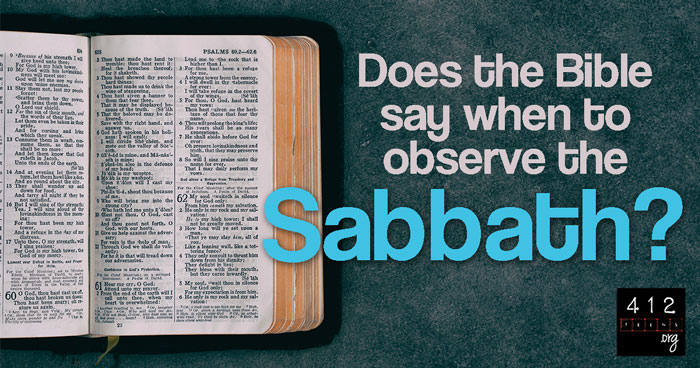Are Christians required to observe the Sabbath?

“The Israelites are to observe the Sabbath, celebrating it for the generations to come as a lasting covenant. It will be a sign between me and the Israelites forever, for in six days the Lord made the heavens and the earth, and on the seventh day he abstained from work and rested.” —Exodus 31:16-17
The Sabbath was a special sign between the Israelites and God, which served as a reminder of their slavery in Egypt and how God delivered them into freedom (Deuteronomy 5:15). During and following Moses' time, the Israelites were required to observe the Sabbath. So it was very important that they knew when the Sabbath started and ended. In fact, it was a matter of life or death, because to disobey this command was punishable by death (Exodus 31:15; Numbers 15:32-35).
Saturday or Sunday?
The first time God mentions the Sabbath is when He gives the Ten Commandments to Moses (Exodus 20:1-17). In describing how the Sabbath will work, He says, "Six days you shall labor, and do all your work, but the seventh day is a Sabbath to the Lord your God" (v. 9a). Why the seventh day? God explains in verse 11: "For in six days the Lord made heaven and earth, the sea, and all that is in them, and rested on the seventh day. Therefore the Lord blessed the Sabbath day and made it holy."
Since the week begins on Sunday, the seventh day is Saturday. The Israelites (and those of the Jewish faith today) considered sundown on Friday to be the start of the Sabbath and sunset on Saturday to be Sabbath's end.
Are Christians today required to observe the Sabbath?
The traditions of the Sabbath are a beautiful way to honor God. I loved the prayers and Sabbath traditions when I was a child and our family observed them. (See: What is the Sabbath?) As an adult, I still love the beauty and intentionally of the Sabbath. But are we, as Christians, bound to hold the Sabbath?
No.
The Sabbath was a day that was required to be set aside by the Israelites. They were bound to a Law that required certain actions as a mandate of salvation, such as circumcision, not eating certain foods, and observing specific holy days like the Sabbath. Christ's sacrifice on the cross has freed us from the need to adhere to the Law for salvation (Colossians 2:13-15). In that way, no, we are not required to observe the Sabbath.
The very first council that was ever gathered (Acts 22) officially declared that several of the key components of the Old Law were not required for someone to be considered a faithful Christian. Paul re-emphasizes this in Galatians and Romans, reminding the faithful that we are only bound to the Old Law if we are personally convicted to adhere to those rules. This is what we call "spiritual freedom."
"One man considers one day more sacred than another; another man considers every day alike. Each one should be fully convinced in his own mind. He who regards one day as special, does so to the Lord." —Romans 14:5-6a (also see Galatians 4:9-10)
But also yes...?
Just because the Old Laws are not required for salvation, that doesn't mean they aren't valuable in some way. After all, there's a lot of wisdom in the Ten Commandments! Christ didn’t come to abolish the Old Law; He came to perfect it—to fulfill it.
"Do not think that I have come to abolish the Law or the Prophets; I have not come to abolish them but to fulfill them. For truly, I say to you, until heaven and earth pass away, not an iota, not a dot, will pass from the Law until all is accomplished." —Matthew 5:17-18
When Jesus was chastised for breaking the legalism of the Sabbath, He replied simply, "The Sabbath was made for man, not man for the Sabbath" (Mark 2:27). God doesn’t ask us to hold to the legalism of the Sabbath, but nor do we ever see Him doing away with it entirely.
Under the Old Law, the harsh rules were required for salvation. Under the New Law, the New Covenant, we are able to see God's resting on the seventh day as model for US. He offers what we need—a day to rest, a day to remember, a day to refresh and reset.
All Things New: What the Sabbath is For
The Bible records the early church meeting on the "first day of the week," Sunday (Acts 20:7; 1 Corinthians 16:2; 2 Corinthians 9:12). However, there's no mention of gatherings or worship on the Sabbath day (Saturday). Yet people were still confused about what Christians were expected to do—and when! Remember, following Jesus Christ was a new thing at the time, and believers were trying to find an equilibrium between their new faith and old religious practices. Correcting this confusion was one of the main purposes for many of the Apostle Paul's letters to the early churches.
Justin Martyr lived during the 2nd century AD and was the first "apologist," which is just a fancy name for someone who defends their faith. When the secular world was trying to lump Christians in with the Jews, Justin was called upon to help explain the differences and the seemingly confusing practices the early Christians had.
"Sunday is the day on which we all hold our common assembly, because it is the first day on which God, having wrought a change in the darkness and matter, made the world; and Jesus Christ, our Savior, on the same day rose from the dead." —Justin Martyr, "The First Apology of Justin" (AD 155)
Just as God created light from darkness on the first day, so too does the resurrection of Christ bring light into a dark world.
When we worship together, we do so not on the seventh day but on the first—the day of the Son of God. As we live our lives, God is pleased with daily praise to Him and daily service to others (Hebrews 13:15-16). And when we rest, we are no longer bound by the Law of Stone (the Ten Commandments) but by the Law of the Heart. Christians today aren't commanded to hold to the Sabbath, but rather, we are invited to rest in the day "made for man"—on any day we choose.
ALSO SEE:
- What is the Sabbath?
- What does the Bible say about legalism?
- What is religious OCD?
- What if I can't go to church?
- Why do I have to go to church?
- Do I have to dress up for church?
- Are Christians supposed to be perfect?
- What is salvation?
- What is my identity in Christ?
- Why was Jesus healing on the Sabbath such a big deal to the Pharisees?
- On what day of the week was Jesus crucified?


TL;DR
The Sabbath is traditionally observed from sundown Friday to sundown Saturday. While God required the Israelites to observe the Sabbath under the Old Law, Christians today are NOT required to observe the Sabbath because Christ has given us freedom (Colossians 2:13-15). We won't be condemned if we don’t celebrate the Sabbath (Romans 14:5-6a). But God modeled for us a day of rest and offers the Sabbath as a gift (Mark 2:27)—a day of rest from the craziness of life and an offer to come sit in His presence.

Writer: Brianna
Brianna is a manager at her favorite childhood bookstore. She is likely to be found curled up with a book and her black cat, Bear, talking to a stranger, dancing outside in a thunderstorm, singing Disney songs while making cookies, or snuggling her best friend's baby while drinking coffee. Her heart is fueled by the desire to help people find their unique wings and use them in whatever capacity God has created them for. She is passionate about seeing and finding Christ in the secular world wherever she can.
